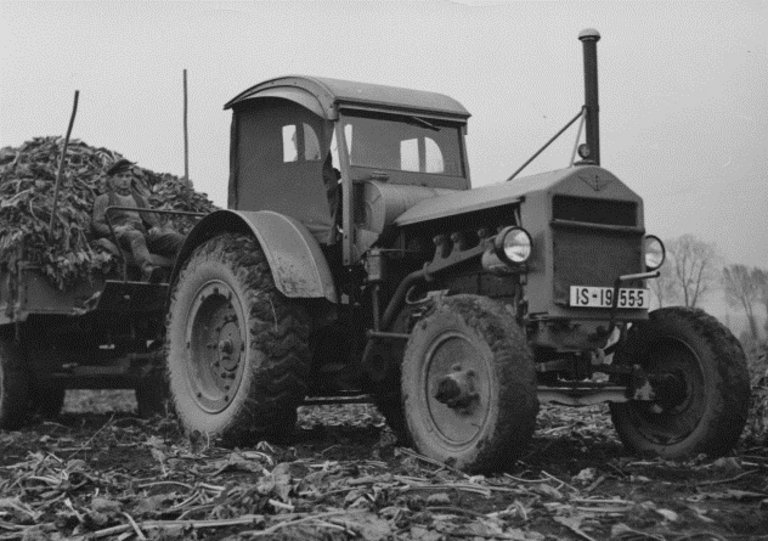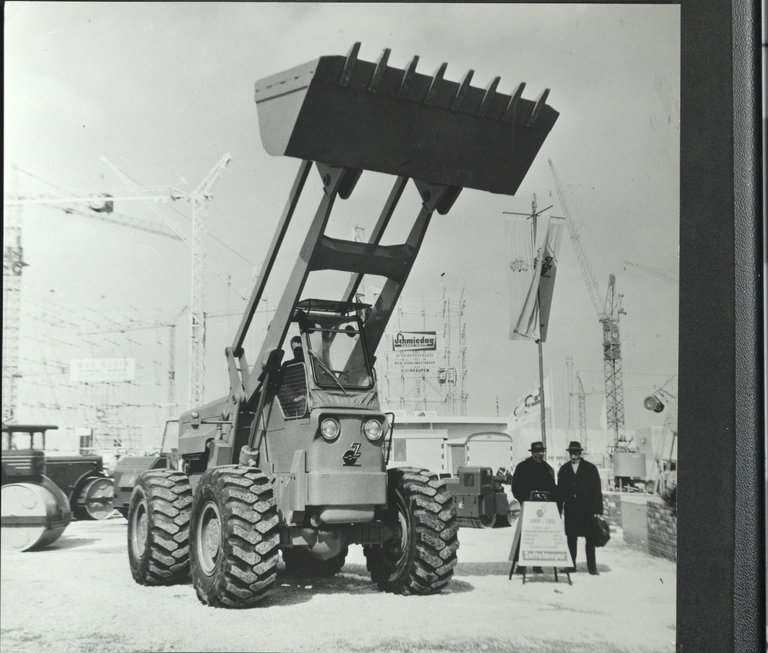150 years of Continental: From “Giddyup!" to high-tech
- Continental celebrates its 150th birthday in 2021
- Specialty tires from Continental Commercial Specialty Tires have made a significant contribution to industrial history
- The wide product range optimally covers the most diverse areas of application today
Hanover, May 10, 2021. In the field, in the harbor, on the airfield: Specialty tires from Continental Commercial Specialty Tires provide traction and movement in a wide variety of applications. Their long history is also a significant chapter in international industrial history.
Raincoats, thermos flasks, bicycle and carriage tires: These were the main products in Continental's portfolio in 1871 after the company was founded in Hanover. Today, 150 years later, Continental is one of the largest global suppliers of the entire mobility industry and one of the most important international technology companies, whose diverse products keep the world moving. Specialty tires for a wide range of industrial, agricultural and mobility applications have also been making a significant contribution to this for roughly one hundred years. All over the world, agricultural, mining, transport and heavy-duty machinery roll on tires that are developed and produced at Continental's Commercial Specialty Tires business unit today.
End of the 19th century: Hoof buffers gave horses secure footing in snow and ice
However, before advancing industrialization called for an increasing variety of specialty tires, horses and carriages were among the most important means of transportation in the 19th century. The drive was usually a brisk "Giddyup!" from the coachman or field worker rather than an engine. Continental therefore produced so-called "hoof buffers" - special rubber designed to prevent horses from slipping on icy surfaces. When Carl Benz registered his patent for the first automobile with an internal combustion engine in 1886, history took its course: The first pneumatic tire with a tube was developed in France in 1889.
1920s: Continental’s innovations for agriculture and industry
Continental had identified agriculture as an important market early on. Later industrial nations such as Germany were primarily agricultural at the time. In 1917, Henry Ford built the first tractor in the USA that is comparable to today's models. Ten years later, agricultural tractors of this type had already become increasingly popular in Europe. The big challenge for tractors was that they had to be safe to drive both in the field and on the road. At the time, this was not possible with conventional tires. Continental reacted and in 1928 introduced the T2™ Tractor Tire - Europe's first pneumatic agricultural tire. Whereas previously it was often necessary to switch between iron and elastic tires when moving from the field to the road, the newer tire models could be used on all surfaces.
Tires that met special requirements were also increasingly needed for transporting the increasingly heavy loads. In production halls and warehouses, in the growing seaports and in the change from individual cargo to container shipping, the demands on the material - and thus on the tires - grew. Previous tire models were often no longer sufficient. In 1920, two years after the end of the First World War, the first elastic solid rubber tire was launched.
Economic Miracle: Specialty tires for handling materials, airports and ports
Material handling developed into a particularly important business area for Continental after the end of the Second World War. "There were more and more special machines and transport vehicles, and the need for customized tire solutions increased," says Matthias Müller, current Product Line Manager Material Handling. The introduction of the standardized Euro pallet in 1961 led to a renewed boom in the industry. Five years later, Continental introduced the first tire called ContiSuperElastic™ (CSE), which still characterizes the product portfolio today.
1955 turned out to be a particularly important year in the post-war period for Continental's specialty tires. In the Western world, agricultural industry was experiencing a major boom: in Germany alone, almost 100,000 tractors were registered that year, more than ever before. Continental presented the AS Farmer™ in the same year. Its new tread design was broader in scope, which was reflected above all in greatly improved self-cleaning properties. Traction on all types of soil was thus increased by 20 percent.
Nuremberg Airport also opened in 1955, the first genuine international airport in Germany after the end of the Second World War. Continental recognized a significant business area here as well: Today, the Hanover-based company is the only one to offer a complete tire portfolio for the airport industry. The technology company produces special tires for all vehicles that travel on the airfield - aircraft tugs, tankers and fire-fighting vehicles, baggage transporters and passenger buses. One tire often used on the airfield is the ContiRV20™ solid industrial radial tire, which has a ribbed tread pattern that causes particularly little vibration.
The port industry has also become a similarly important business segment for Continental Commercial Specialty Tires. Here, the portfolio grew in line with the increasing importance of the transport of goods, raw materials and loads transported by sea. Today, Continental offers a comprehensive product portfolio with special solutions for every conceivable loading and unloading machine in the world's major container ports. The ContainerMaster+™ model, which is also used in ports for container loaders and transporters, among other things, turned out to be a real all-rounder.
1990s: Internationalization in the agricultural tire segment
Thanks to progressive developments, agricultural tires became increasingly popular. In the 1990s, Continental expanded its presence in foreign markets, especially in Europe and North America, and became an original equipment supplier for a large number of agricultural vehicle manufacturers worldwide. In 2004, the agricultural tire segment was sold - as a result of a concentration of the overall business. As a result, the license to produce and market agricultural tires under the Continental brand was transferred to CGS/Mitas. Development and sales of products and solutions from Continental's Automotive division continue unaffected - and customer demand for Continental agricultural tires is increasing.
Continental also experienced further growth in the material handling sector in the 1990s. In 1991, the 1.5 millionth CSE tire rolled off the production line at the Korbach site, and by the year 2000, 3.5 million CSE tires had been produced. The CSE portfolio was previously expanded in 1994/95 to include the CSE Robust SC 15™.
On the occasion of its 150th birthday: Completely renewed portfolio for a wide range of industries
In 2016, Continental reacquires its brand rights ahead of schedule and returns to the agricultural tire market in 2017 with the premium radial tires Tractor70™ and Tractor85™. In the same year, the company opened its new agricultural tire plant in Lousado, Portugal. Since then, the updated portfolio has also included the premium radial tire TractorMaster™, a robust and low-wear model that performs well both in the field and on the road thanks to its high level of comfort.
A particularly demanding and important area of application for tires for Continental is the mining and construction segment. The company has been meeting this challenge for many years. At the end of the 1990s, Continental entered the market with its first own Earthmoving EM3™ OTR radial tire and has been continuously expanding its product range ever since. Tires on construction sites and in mines must always perform optimally in wet conditions, scorching heat, freezing cold and on sand or earth, but also in mud and on sharp gravel. Such a special tire from Continental's Earthmoving portfolio can be up to 2.20 meters in diameter and weigh up to a ton.
Equipped for the future with digital solutions
These extreme conditions require high durability and performance from the special tires and will continue to be more demanding in the future. To keep a constant eye on the condition of its tires, Continental therefore increasingly relies on digital tire monitoring: To complement ContiPressureCheck™ and ContiConnect Yard™, the company has developed ContiConnect™ Live. With the help of this unit, the data collected on tire pressure and temperature is sent in real time to a cloud via a central telematics unit. In addition, ContiConnect™ Live uses GPS to transmit the location of the vehicle and records the operating hours of the tires. Fleet managers thus have a faster and more convenient overview of the condition of the vehicles, regardless of their location. By evaluating the information, the fleet benefits from reduced downtime, lower maintenance costs, and increased operating time, making it fit for the future.
From the first elastic solid rubber tires in 1920 to the producer of specialty tires for harbor cranes, agricultural machinery, a wide variety of construction equipment and tunnel drilling machines - Continental's Commercial Specialty Tires have played a key role in writing important chapters of international industrial history over the past 100 years.

Julia Reinhold
Communications Manager Commercial Specialty Tires
Specialty Tires
Continental Tires
- +49 511 938-2570



